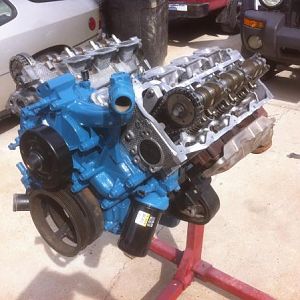You are using an out of date browser. It may not display this or other websites correctly.
You should upgrade or use an alternative browser.
You should upgrade or use an alternative browser.
Hydrogen generator in the KJ
- Thread starter chirokj
- Start date
Disclaimer: Links on this page pointing to Amazon, eBay and other sites may include affiliate code. If you click them and make a purchase, we may earn a small commission.
well, ive been making different versions of these things for a few weeks now because i got tired of wondering if it really works. My vids on youtube is a must watch to see what i mean. i absolutly can get combustible gas from water using one of these things and it cost me less than $20 for the material at Home Depot. Have i tried it in my KJ?, no Will I? Yes! My first vehicle though will be my old truck as it is carburated and theres less to mess up if something goes wrong.
Flair, of course you can get combustible gas using what looks remarkably like electrolisys. The problem is, how are you going to produce enough combustible gas to actually power anything? The amount of energy (not even beginning to talk about loss) to create the hydrogen will not be a small affair. Here's what you've got:
A battery creating hydrogen. Why don't you just add batteries to your car and call it a hybrid? That way you won't lose anything in the process.
tjkj2002
Full Access Member
- Joined
- Dec 17, 2006
- Messages
- 10,612
- Reaction score
- 42
rofl2.gif(biggthumpup)rofl2.gifit can work and does.
What poeple do to save a buckscrewy.gif,that ends up costing them more in the long run.
rofl2.gif(biggthumpup)rofl2.gif
What poeple do to save a buckscrewy.gif,that ends up costing them more in the long run.
My favorite story on this line is people who drive around, shopping for gas.
Even at the current doubling of gas prices, if you drive any distance (more then a few miles-- counting both sides of your trip) to by gas which is .10 even .15 cents cheaper, you're probably losing money, and at minimum, are saving only tens of cents on your entire fillup. And that still assumes you're doing a complete fillup.
ok then, sorry that i tried to help.#-o
Flair,
Please don't take my comments as an insult. I'm just skeptical of hydrogen produced by anything less than some sort of enterprise class process that will burn in your ICE and improve your gas mileage in a way which will be worth the cents per gallon saving.
VTNomad
Full Access Member
Hho
Gasoline's power comes from the expansion when it is combusted and converted from a liquid to a gas. HHO is already a gas and will expand when heat is generated, but nothing like a phase change expansion.
Check out dry ice bombs on YouTube for a demonstration.
Gasoline's power comes from the expansion when it is combusted and converted from a liquid to a gas. HHO is already a gas and will expand when heat is generated, but nothing like a phase change expansion.
Check out dry ice bombs on YouTube for a demonstration.
Flair,
Please don't take my comments as an insult. I'm just skeptical of hydrogen produced by anything less than some sort of enterprise class process that will burn in your ICE and improve your gas mileage in a way which will be worth the cents per gallon saving.
i was very skeptical too before i started messing around with this stuff. im not lying or trying to sell anyone aything so why wouldnt i be honest? this gas does burn and can make a difference if you can generate enough. either way, if it works alot great, if it works just a bit great. its water and free.
the best thing for anyone who doubts this or just is curious needs to do, is make them one and just hook it up to a battery and see for yourself. its very simple. its also pretty safe as long as you use common sense. im gonna run mine on my old truck starting this weekend and see if i get any mpg gains. maybe i will, maybe i wont, but you have to try right?
also keep in mind that gas isnt the only thing that can run an engine. i know of people who use propane to run their trucks and cars. its all about combustion.
icarl
Full Access Member
I've done a little digging on the internet and found some interesting results. For instance, there is one guy that claims to have run his car on water alone for years. I think that this would be an interesting and fun experiment to do on an older non fuel injected vehicle. People can say what they want but unless you do the experiment you don't know for sure. That's how science works. Trial and error. Experiments disprove scientific theories all the time. Einsteins theory of relativity made no sense to people but it was based on observations of the speed of light. Sure you may not gain mpg from it but from the looks of it, it is a not a huge cost to set up and you will gain experience from it that may give you some ideas.
There is also one other thing that nobody mentions and that is the combined effect of hydrogen and gas. According to proponents hydrogen burns hotter and therefore acts like a catalyst for the regular gas to burn more efficiently. Normally gas is wasted and has to burned up in the catalytic converter. With HHO apparently you do not need a catalytic converter as all of the gas is burned. In theory this would be better for the environment since unburned gas is carbon monixide which is much worse than CO2. Also, the real energy boost may come from this extra use of energy that was previously wasted in unburnt gasoline. For instance if the gasoline engine has an efficiency of 40% and the HHO system has an efficiency of 90% then the combined efficiency is increased to at most 65%.
There is also one other thing that nobody mentions and that is the combined effect of hydrogen and gas. According to proponents hydrogen burns hotter and therefore acts like a catalyst for the regular gas to burn more efficiently. Normally gas is wasted and has to burned up in the catalytic converter. With HHO apparently you do not need a catalytic converter as all of the gas is burned. In theory this would be better for the environment since unburned gas is carbon monixide which is much worse than CO2. Also, the real energy boost may come from this extra use of energy that was previously wasted in unburnt gasoline. For instance if the gasoline engine has an efficiency of 40% and the HHO system has an efficiency of 90% then the combined efficiency is increased to at most 65%.
icarl
Full Access Member
So I got bored, I have insomnia, so I did a little homework on HHO.
The HHO theory:
An electric current is used to break the chemical bonds in water to separate the hydrogen and oxygen (electrolysis). That hydrogen is then combusted and the additional energy of the combustion of hydrogen is added to the energy from the combustion of gasoline, increasing your MPG's. Here's where I found some variation in the HHO theory. Assumption 1: The alternator in your vehicle produces more electricity than you need so you can use this extra free electric energy for electrolysis. If it didn't, your vehicle would stall every time you turned on another electrical component; OR Assumption 2: The amount of electric energy required for electrolysis is far less the amount of chemical energy obtained from the combustion of hydrogen. Or these assumptions are both used. The assumption that the oxygen needed for combustion is also produced with electrolysis, and that no outside oxygen is need. This means that this is a closed system, more on this later.
Scientific Law: The law of conservation of energy: Energy cannot be created nor destroyed; it can only be changed from one form to another.
An internal combustion engine converts the chemical energy stored in gasoline to mechanical energy. In the presence of oxygen, a spark is used for ignition. Ignition causes the gas to expand (mechanically), forcing the pistons down, turning the crankshaft, which eventually turns the wheels. (This reaction is quick, and the gases produced are ejected before they have completely expanded. So the theory that HHO adds more gas, or more heat making the gases expand more, or more rapidly, is false). This conversion of chemical energy to mechanical energy also produces heat, and light energy, which your engine does not use. So the mechanical component is the only useful component, and the heat and light produced are wasted. Only 30% of the chemical energy in gasoline is actually converted to useful mechanical energy. The other 70%, since it cannot be destroyed, is converted to useless heat and light.
This mechanical energy in turn, is used to spin an alternator, creating an electric field, essentially converting mechanical energy to electrical energy. There are losses here as well. Slipping and/or stretching of the belt, friction of the bearings, and wind resistance (drag) of the spinning components. The alternator efficiency varies by depending on the alternator, but usually has an efficiency of 45-70%.
Here's where the HHO assumptions come in.
Assumption 1: The alternator produces more electricity than is needed. For a second, let's assume this is true. If it is, and energy cannot be destroyed, only transformed, where does it go when it isn't used? Your alternator would be sending out lightning bolts if this were the case, or producing massive amounts of heat. Look at how much heat is produced by gasoline, which has an energy efficiency of 30%. If the were the case with an assumed 70% (best case scenario) efficient alternator, think of the amount of heat that would be produced when this "unused energy" isn't being put to use.
So your alternator doesn't produce extra energy. Where does the additional energy come from when you turn on extra electrical accessories (hint: it's not the battery, your battery is not used as a source of electricity while the vehicle is running. The battery stores electricity, chemically, for use when the alternator is not spinning.) The alternator gets its extra energy from the mechanical energy of the engine, robbing your engine of more efficiency.
The alternator is already spinning. The energy to do this is produced by the engine. When an energy demand is placed on the alternator it in turn places that load onto the engine in mechanical form. However, the energy to spin the mass of the alternator prior to the load is being used regardless of whether or not there is a load on it. The energy is not being created or destroyed but it is more efficient energy over an electical generator in the sense that this initial energy is being wasted regardles of load. It is taking advantage of already inefficient system.
Assumption 2: The amount of energy needed to break the chemical bonds is less than the amount of energy produced from the combustion of hydrogen. Remember, this is a chemically closed system with HHO, all the needed oxygen is provided by electrolysis. The only thing entering the system is the electricity. (If it wasn't, this would rob oxygen needed for the combustion of gasoline, which would cause less gasoline to burn causing your engine to run 'rich' and thus lowering efficiency). So you're breaking the chemical bonds of water, only to reform them. Remember, energy cannot be created nor destroyed. What exactly does this do? Essentially it converts electric energy from the alternator, into heat, which we already stated was USELESS in a mechanical engine!
In my limited knowledge of electrolysis I have heard that experiments were done on electrolysis and found that it takes more energy to create the hydrogen than is produced from it. However, this was done in a closed system that is not taking advantage of an electrical source like an alternator. The efficiency may be increased due to the alternator already spinning (wasting energy). So it would be interesting to do an experiment and see if it actually works.
Also, one thing you have not mentioned is the combine effect of Hydrogen as a catalyst on the gasoline. According to HHO propents HHO burns hotter and quicker acting as a catalyst to increase engine efficiency of the gasoline itself. Normally, gas is wasted and has to be burned further in the catalytic converter. This catalytic converter is apparantly not needed in a HHO system.
It is difficult to just dismiss something as complicated as this without doing experiments.
its water and free.
But that's just it, flair, it's not free. There is an energy input required to produce the resulting gas. That energy input is quite significant if you want to produce any amount that will make any serious quantity of usable fuel.
So you must make some choices about what source of energy you're going to use for your input. If you use batteries, you have to charge them somehow. The only viable use of electricity to produce hydrogen is solar. Any other form of electricity is probably a bust because you might as well use the electricity at 100% efficiency instead of using electricity to create hydrogen, losing 50% of your energy in the process.
For instance if the gasoline engine has an efficiency of 40% and the HHO system has an efficiency of 90% then the combined efficiency is increased to at most 65%.
Yes, but refer to VTNomad's post on the expandability of hydrogen vs. the expandability of liquid fuel.
In my limited knowledge of electrolysis I have heard that experiments were done on electrolysis and found that it takes more energy to create the hydrogen than is produced from it.
You heard right. This is why realistically, the only input that should be used to produce hydrogen is an input which is already going to waste-- the alternator is one theory. I have mentioned solar in several previous posts. While the sun shines, there is plenty of power which can be harnessed to produce hydrogen. The only question is, how many sq feet of solar panels will produce how much hydrogen? The answer is usually a lot to get a little. I submit that the alternator would have to turn quite a bit to produce a very small quantity of hydrogen.
The efficiency may be increased due to the alternator already spinning (wasting energy). So it would be interesting to do an experiment and see if it actually works.
Believe it or not, everything does not always need an experiment, sometimes it just needs some calculation. To quote the great Nikola Tesla:
"If Edison had a needle to find in a haystack, he would proceed at once with the diligence of the bee to examine straw after straw until he found the object of his search. I was a sorry witness of such doings, knowing that a little theory and calculation would have saved him ninety percent of his labor."
A simple running of numbers with some knowledge of your inputs and outputs are all that's necessary. It can be easily calculated how much hydrogen can be produced through electrolysis with i amount of input over t amount of time.
Normally, gas is wasted and has to be burned further in the catalytic converter. This catalytic converter is apparantly not needed in a HHO system.
Here's the thing on that. "I heard of a guy; I met a guy; I know this guy" really pales in comparison to the fact that GM is closing down, what, three manufacturing plants, posting record losses and having to rethink their entire business process because *surprise* their cars are too thirsty. Despite all the conspiracy theorizing, it is in the best interest of the car manufacturers to produce a high mileage car. There are manufacturers, right now, who are putting everything they have into producing a high mileage car. And guess what, it's frickin' hard to do.
The smallest car on the road, bar none, is the Smart Car. It's a two seater with almost no cargo capacity. It gets a combined mileage of 36mpg. 36mpg. Let me say that again, 36mpg. Toyota's fantastically popular Prius, a marvel of technology using (sorry, hate to repeat myself) electricity DIRECTLY to produce forward motion, not indirectly to produce hydrogen, then use the hydrogen to assist forward motion-- therefore suffering no loss of efficiency from the produced electricity-- only gets a combined mileage in the 40mpg (real) range. the point here is, that these cars which are the models of high mileage, get a little over twice my combined average, and maybe...maybe 3x my combined mileage, respectively.
If I were to sell my Jeep at its current value and buy one of these vehicles, it would take years to recover the cost of doing so, even at the current high gas price of $4.21 for low-grade regular.
As the old adage goes, if it sounds too good to be true, it probably is.
It is difficult to just dismiss something as complicated as this without doing experiments.
I disagree. These are not vague theoretical problems that we have no math to describe. they are simple problems of physics: Energy input vs. energy output, how much energy (watts) does it take to move 1lb of weight... Adding a small bit of hydrogen to your ICE is probably not going to make any significant difference, and may actually hinder your performance through damage or cost.
Last edited:
Some interesting facts:
How about putting solar cells on the roof of my car?
Our cars take a lot of energy and while there is a lot of energy in sunlight, the rooftop of your car does not have enough area. For an average car you’d need something like the size of a football field – not very practical.
Right there, that tells you that the amount of power to produce enough hydrogen to run your car 100% is HUGE. A solar cell the size of a football field is going to produce INFINITELY more power than your alternator could ever hope to produce. So given that, the amount of hydrogen you're going to produce via your alternator as a suppliment to your gas will be so miniscule, that even if you don't burn up your engine, you may not even notice. You'd probably be getting a 'burp' of hydrogen ignition every several hundred miles.
http://fuelcellsworks.com/JustthebasicsonHydrogen.html
How about putting solar cells on the roof of my car?
Our cars take a lot of energy and while there is a lot of energy in sunlight, the rooftop of your car does not have enough area. For an average car you’d need something like the size of a football field – not very practical.
Right there, that tells you that the amount of power to produce enough hydrogen to run your car 100% is HUGE. A solar cell the size of a football field is going to produce INFINITELY more power than your alternator could ever hope to produce. So given that, the amount of hydrogen you're going to produce via your alternator as a suppliment to your gas will be so miniscule, that even if you don't burn up your engine, you may not even notice. You'd probably be getting a 'burp' of hydrogen ignition every several hundred miles.
http://fuelcellsworks.com/JustthebasicsonHydrogen.html
But that's just it, flair, it's not free. There is an energy input required to produce the resulting gas. That energy input is quite significant if you want to produce any amount that will make any serious quantity of usable fuel.
So you must make some choices about what source of energy you're going to use for your input. If you use batteries, you have to charge them somehow. The only viable use of electricity to produce hydrogen is solar. Any other form of electricity is probably a bust because you might as well use the electricity at 100% efficiency instead of using electricity to create hydrogen, losing 50% of your energy in the process.
i see what your saying, and technically, there is no free energy.. what im saying is that if i can get any results at all in mpg gains just from water...then to me it is free. i can get rain water if i need to do this, i can use my urine if i need to. but of course i have a well so that is pretty free. do you see what i mean???
Like the other guy said, its just using the already existing system and adding to it so to speak. Im hooking it up to my truck tomorrow and ill keep you guys posted.
icarl
Full Access Member
You heard right. This is why realistically, the only input that should be used to produce hydrogen is an input which is already going to waste-- the alternator is one theory. I have mentioned solar in several previous posts. While the sun shines, there is plenty of power which can be harnessed to produce hydrogen. The only question is, how many sq feet of solar panels will produce how much hydrogen? The answer is usually a lot to get a little. I submit that the alternator would have to turn quite a bit to produce a very small quantity of hydrogen.
Okay, and someone should test to see how much hydrogen an alternator will generate.
Believe it or not, everything does not always need an experiment, sometimes it just needs some calculation. To quote the great Nikola Tesla:
"If Edison had a needle to find in a haystack, he would proceed at once with the diligence of the bee to examine straw after straw until he found the object of his search. I was a sorry witness of such doings, knowing that a little theory and calculation would have saved him ninety percent of his labor."
A simple running of numbers with some knowledge of your inputs and outputs are all that's necessary. It can be easily calculated how much hydrogen can be produced through electrolysis with i amount of input over t amount of time.
That's sounds nice in theory, but in reality can we not calculate the output of electrolysis without past experimentation. You can't sit there and calculate the output of hydrogen unless someone at some point has gone and measured that output and done experiments that give us the formulas to calculate it in the first place. All your formulas are based on past experimentation and observations. All I'm saying is experimentation is needed to verify the results that some are claiming to get. We do not know everything and can not assume to know.
Here's the thing on that. "I heard of a guy; I met a guy; I know this guy" really pales in comparison to the fact that GM is closing down, what, three manufacturing plants, posting record losses and having to rethink their entire business process because *surprise* their cars are too thirsty. Despite all the conspiracy theorizing, it is in the best interest of the car manufacturers to produce a high mileage car. There are manufacturers, right now, who are putting everything they have into producing a high mileage car. And guess what, it's frickin' hard to do.
The smallest car on the road, bar none, is the Smart Car. It's a two seater with almost no cargo capacity. It gets a combined mileage of 36mpg. 36mpg. Let me say that again, 36mpg. Toyota's fantastically popular Prius, a marvel of technology using (sorry, hate to repeat myself) electricity DIRECTLY to produce forward motion, not indirectly to produce hydrogen, then use the hydrogen to assist forward motion-- therefore suffering no loss of efficiency from the produced electricity-- only gets a combined mileage in the 40mpg (real) range. the point here is, that these cars which are the models of high mileage, get a little over twice my combined average, and maybe...maybe 3x my combined mileage, respectively.
If I were to sell my Jeep at its current value and buy one of these vehicles, it would take years to recover the cost of doing so, even at the current high gas price of $4.21 for low-grade regular.
As the old adage goes, if it sounds too good to be true, it probably is.
And you mention this because ...? We are talking about HHO fuel technology. There is a lot of experimental cars made today by all of the major manufacturers that get high gas mileage. The technology is already here today. Reliability of automobiles also plays a role in people's decisions to buy. GM automobiles have been improving and have come out with a lot of good vehicles this year. I would not be surprised to see them make improvements in the near future.
I disagree. These are not vague theoretical problems that we have no math to describe. they are simple problems of physics: Energy input vs. energy output, how much energy (watts) does it take to move 1lb of weight... Adding a small bit of hydrogen to your ICE is probably not going to make any significant difference, and may actually hinder your performance through damage or cost.
You may be right but unless someone tests it out it can not be disproven. All good scientific theories are subject to experimentation. Without it we could not have science. Take astrology for example. How can you disprove astrology? You can't really because it is based on people's beliefs. However HHO fuel theory can be disproven or validated depending on the results of experimentation. I'm tired of people who say we know everything and don't even bother to listen to anything new just because it contradicts their current thinking. No one would have listened to Einstein if everyone thought like that. That to me is not what science is about. Science should be about the quest for knowledge that is found through observation and experimentation. Theory is one thing but experimentation is the proof of the pudding. One of my courses in college was robotics. You can theorize about the physical world of robotics all you like but when you actually test out your robot you find out it is a lot more complicated than your theory led you to believe.
C.W.
Full Access Member
Let us know how it goes, Flair. And it would help to know what system exactly that you are putting in, since there are different designs.
This one?
http://water4gas.com/2books.htm?hop=5startech
This one?
http://water4gas.com/2books.htm?hop=5startech
icarl
Full Access Member
Also, if your interested i found a lot of information here
http://www.free-energy-info.co.uk/Chapt10.html
http://www.free-energy-info.co.uk/Chapt10.html
i think the major setback will be the output from the altenator. i dont know hte exact details but from what ive tried to find out, it seems to be that the more current you can get to the cell, the better as long as you dont overload it. it seems that most of the people ive seen on youtube that can run on HHO only, has many cells linked together and atleast 2 altenators and 2 batteries to carry the extra load they need to produce that much gas. i doubt ill go that far with it unless i get good results from a simple setup first.
look up "satchelmcqueen1" as a person on youtube to see what ive done so far. i have about 6 vids or so saved in my account that ive put up showing what ive tried so far. i doubt much will come from it, but who knows until i try.
look up "satchelmcqueen1" as a person on youtube to see what ive done so far. i have about 6 vids or so saved in my account that ive put up showing what ive tried so far. i doubt much will come from it, but who knows until i try.
o8k
Full Access Member
- Joined
- Mar 21, 2007
- Messages
- 742
- Reaction score
- 3
man when yall get to drinkin, ya go all stephan hawking on us. heres my 2 cent... drive less, carpool, plan your daily travel more effective, get a scan gauge to remind u to get your foot out of it., coast up to intersections, (can give u a practical savings of between 10% - 50% depending on how agressive you get with the techniques mentioned... or if u insist on being all capt alterna-fuel...
get a LNG convert kit er something. solar panels at the house to charge your electric car.
get a LNG convert kit er something. solar panels at the house to charge your electric car.
Similar threads
- Replies
- 12
- Views
- 972
- Replies
- 6
- Views
- 875
- Replies
- 31
- Views
- 3K
- Replies
- 5
- Views
- 2K










